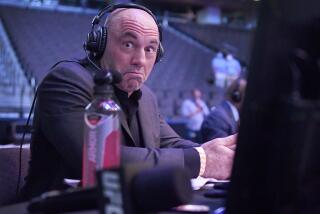Spector -- and expert witnesses -- on trial
- Share via
At Phil Spector’s murder trial last week, Deputy Dist. Atty. Alan Jackson flatly dismissed the testimony of a series of experts for the defense, calling them “pay-to-say” witnesses who received more than $400,000 in return for doing just what was expected of them. “How does a homicide become a suicide? You write a big, fat check,” Jackson told jurors. “If you can’t change the science, you buy the scientist.”
That’s a standard argument in courtrooms across America. One side brings in expert witnesses to explain something complicated or technical; the other side shoots them down by attacking their credibility.
It’s a cynical tactic, but it works because, unfortunately, it’s basically true. Expert witnesses don’t have much credibility. Generally they have been carefully selected by sophisticated lawyers who know exactly what they’re looking for. The experts (primarily doctors, but also bloodstain specialists and ballistics whizzes as well as all sorts of other scientists and scholars) are then prepped by the lawyers so that the bulk of their testimony is worked out even before the trial starts. Finally, they’re paid -- in the Spector case, one witness received what Jackson called a “horse-choking $181,000” -- by the very lawyers who hope to get a particular answer out of them and who, in many cases, they hope to work for again in the future.
We’re not saying these witnesses are liars; most, no doubt, tell the truth as they believe it to be. But they are, by the very nature of the system, partisan. The more reasonable, measured or objective an expert is, the less desirable he is to those who do the hiring. As the famed litigator Melvin Belli once said: “If I got myself an impartial witness, I’d think I was wasting my money.” The result is that when two hired experts go up against one another, it’s often the best performer who wins -- if, that is, the judge and jurors don’t dismiss the whole exercise out of hand.
This is not a recent glitch in the legal system. In 1848, in his “Treatise on the Law of Evidence,” Judge John Pitt Taylor noted that “skilled witnesses” were less credible than any other kind because their views could be “made to correspond with the wishes and interests of the parties who call them.” (For what it’s worth, he also singled out enslaved people, women and foreigners for skepticism.) In 1923, the jurist John Henry Wigmore wrote that “professional men of honorable instincts and high scientific standards look upon the witness box as a Golgotha, and disclaim all respect for the law’s methods of investigation.”
Still, it doesn’t have to work this way. Many countries have opted for entirely different approaches. In Germany, for instance, only the judge may select expert witnesses. Australia is experimenting with a system known as “hot tubbing,” in which the experts are chosen by the two sides but are then required to testify at the same time -- so they can discuss the case and ask each other questions. The British have recently adopted a system in which both sides must agree on a single expert. If they can’t come up with a mutually acceptable person, the judge decides for them. This not only cuts costs but creates incentives to find experts who are moderate and credible -- rather than well-paid showboats.
Our own system isn’t likely to change soon, mostly because the powerful trial lawyers lobby has little interest in reforming it. But the Spector trial arguments suggested, yet again, that we’d be better off with an approach that seeks truth rather than one that encourages partisanship and devalues expertise.
More to Read
A cure for the common opinion
Get thought-provoking perspectives with our weekly newsletter.
You may occasionally receive promotional content from the Los Angeles Times.










